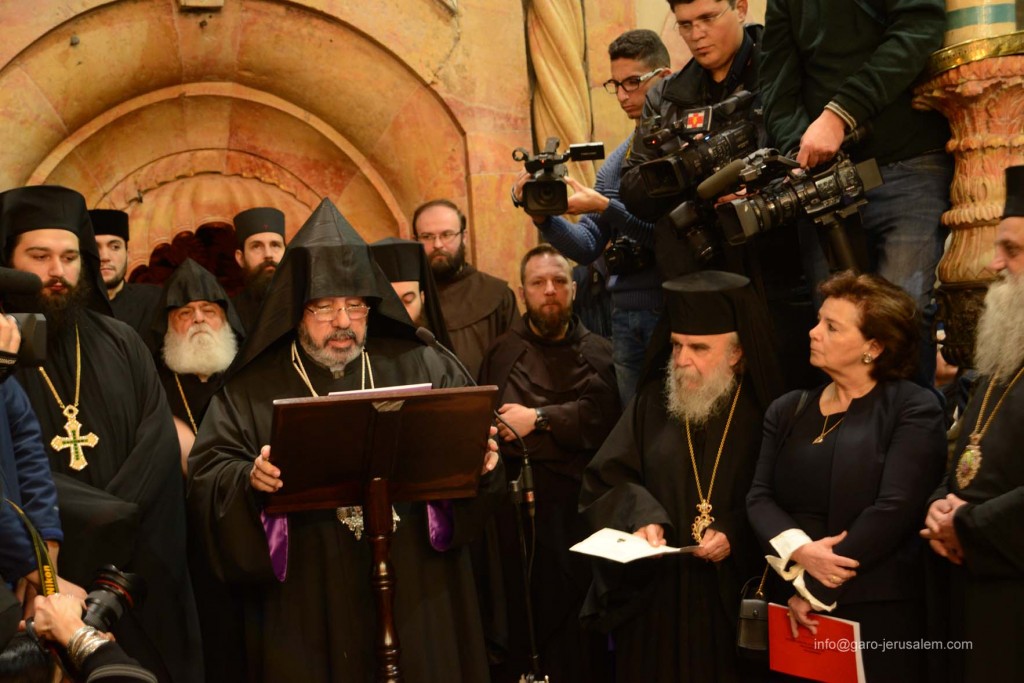
Speech of Patriarch Nourhan Manougian of the Armenian Patriarchate of Jerusalem at the Restoration Ceremony of the Holy Aedicule

The Armenian Apostolic Orthodox Patriarchate of Jerusalem – 23/3/17
The entire Christian world is rejoicing today at the reopening of the Holy Aedicule after months of restoration and reinforcement. Today as we stand in front of this holiest of all the Christian shrines throughout the world, we are inevitably reminded of the passion and crucifixion of the Son of Man, God of God and Light of Light, his burial right here and his glorious Resurrection. That memory inspires us and millions of other fellow Christians claiming to be his followers with awe, since this small, humble and empty structure is the doorway for mankind to eternal life.
These hallow surroundings prompt us, on this very rare occasion, to remember with gratitude and affection all those early Christians who under severe persecution attended this site and marked it as a shrine. We must not forget the Roman Emperor Constantine the Great, his mother, Queen Helena, the princes, princesses and the faithful who repaired, restored and renovated the Holy Aedicule with the surrounding churches and chapels throughout the Middle Ages and modern times, and all the Christian pilgrims who came here to pray. I am sure all prayed for peace on earth and goodwill among men, as we do today. With the intercession of the saints let us pray for the souls of pilgrims and benefactors of past times who are now at rest in Christ and for the spiritual and physical wellbeing of all the pilgrims here today as well as those who will come.
We all acknowledge that Christian worshippers from one end of the earth to the other are the heirs of this sacred site where heaven and earth meet and where the three heads of the most ancient churches have for centuries been delegated with the responsibility of guardianship. This sacred heritage bequeathed to us should make us aware of our important role and obligations. Every year we witness worshippers flock these sites as pilgrims in order to feel closer to Christ, and they take with them unique spiritual experiences from here to their respective lands. Most of them recognize us, the guardians, not as Greek, Roman Catholic, Armenian clergy or monks, but as the custodians of the Holy Sepulcher and the other dominical sites. The burden of this responsibility that transcends the maintenance of buildings is more serious than meets the eye and requires a tremendous spiritual effort on our part to fulfill the expectations of our fellow Christians. That spiritual effort warrants a serious consideration today as we enter a newly renovated Aedicule to pray.
First and foremost, we must earnestly pray to our Lord Jesus Christ to give us wisdom and ability to observe literally among ourselves His great commandment of love. Let us all remember to what he says in the Gospel according to John: “I give you a new commandment, that you love one another; just as I have loved you, you also should love one another. By this everyone will know that you are my disciples, if you have love for one another.” (John 13:34-35)
My dear brothers, we all read the same gospel and the same verse in our respective dialects and profess the one and the same Jesus Christ as being the Son of God, God of God and Light of Light. We have no difference of opinion in regard to this commandment. Thus, unless we accept the Lord’s great commandment of love and express it in words and deeds, how could we consider ourselves Christ’s disciples?
Our united effort to restore the Holy Aedicule and the great spirit of cooperation among our churches here and outside, were wonderful signs of Christian solidarity and indicate that our love for Christ and his teachings are above cultural, liturgical, linguistic and doctrinal differences. We know that differences of opinion and even quarrels among the followers of Christ existed even in the days when he was preaching in the Holy Land. St. Paul’s letters and writings from the Apostolic age also reveal serious disagreements and divisions in the early Church. Notwithstanding these, the Church of Jerusalem and the churches of the gentiles functioned as One Body of Jesus Christ. We ourselves witnessed how Christ’s love brought us together on this occasion and shall bring us together at all times, provided that we follow his commandment of love. This commandment prompts me today, as one of the three traditional guardians of the Dominical sites in the Holy Land to consider the status of other Christian churches in this holy city. Three of these, the ancient churches of Antioch, the Syriac, Alexandria, the Coptic and the Ethiopian Church already have certain privileges in and around the church of the Holy Sepulcher. But the Anglican and the Lutheran churches, though present here in Jerusalem, have no presence in this ancient Cathedral. On this festive occasion, I respectfully ask my brothers in Christ, His Beatitude the Greek Orthodox Patriarch and His Paternity the Franciscan Custos, to consider giving the mentioned five Christian churches the privilege of offering the Divine Liturgy inside the Holy Aedicule once a year after Easter. I am sure that this will please our Lord Jesus Christ in heaven and will be a most positive step for us here towards Christian unity and solidarity.
Let the example that we set on this occasion become a model for our times and for the posterity. Let us always bear in mind St. Paul’s advice to the Romans: “Let love be genuine; hate what is evil, hold fast to what is good; Love one another with brotherly affection, outdo one another in showing honor.” (Rom. 12:9-10)
I would like also to take this opportunity to thank all those governments organizations and individuals who morally and financially supported this God pleasing project. Thank you and God bless you all.
Archbishop Nourhan
Armenian Patriarch of Jerusalem
